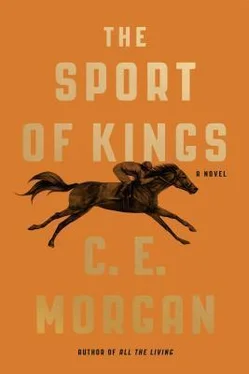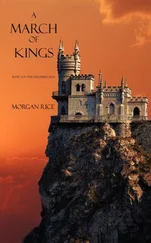Suddenly, Henrietta cranked the wheel to the right and with a savage kick to the gas singed blacker marks onto the black interstate. The whining engine overpowered thought as she sped down 75, passing cars and trucks and horse trailers and the vast farms with their overwrought houses, which seemed to wriggle and wave luridly in their ostentation. She had half a mind to drive down to the old town of Berea and hike in the foothills of the springtime Appalachians — that was a beauty without thumbprints, where the mountains were not blasted, there the spring grass would be punching up like knife blades through the soil — but ten minutes later, after darting erratically through the interstate traffic, she exited on a whim at Man O’ War. To her shock, she discovered that the old Hamburg Place stud farm, where so many extraordinary horses — Nancy Hanks; Plaudit; Lady Sterling, dam of Sir Barton — were buried, was being leveled and graded. She hadn’t been here in ages. How was this possible? The farm was an institution, a monument to the sport that had not built the town but had made it matter. A low string of buildings, what appeared to be an outdoor shopping mall, was being erected over that fertile bluegrass soil, now degrassed and drained. She idled the car at the edge of the construction site, watching the enormous mechanical birds swooping for soil and spitting it out again — detritus now — in red, cloddy heaps behind the rising structures. The birds flying lazily, searching for prey, swinging low on the steel wing and snatching. She thought soon all the land would sound like nothing, and no one would know it had once made sounds, that small civilizations had thrived in the grass. It would never register with life again. And what was coming? Concrete. Glassed fronts and sale signs and cash registers. And with it all, people in a torrential surge, carnivorous men and women looking to smear their skin with colors and creams, to bleach their hair, to shave their hides, to cinch themselves breathless in order to think themselves beautiful. The idea of it redoubled her horror at the day and its losses. But the indignation was easily banked by resignation. What was the point in mourning what couldn’t be stopped? And it truly was unstoppable, the swollen stream of humanity’s consumption, strong enough to take the old horses’ bones — animals so perfect they had become things of myth — and displace them forever, God knows where. No, wait, right there, hidden in trees, at the edge of a Walmart parking lot.
They should have just barbecued Secretariat, because no one ever really gave a fuck. Cry with joy when he crosses the line, then eat him. There were no more true believers.
She didn’t know what to do. How best to forget a day like this? Henrietta reversed and peeled out of the lot, heading downtown toward the stunted high-rises of this provincial town, a city that first repelled Northern aggression and then strengthened itself on a genteel aggression, smiling on its own smallness and petty prettiness. She felt herself to be nearly in a mania. Out of nowhere, clattering hail fell and, jarred, she watched the tiny balls of ice pop and bounce on the ground and percuss on the steel hood and roof of the car. She lifted her foot off the gas, aware she had been speeding; she was no longer in Paris, where she could always say, “I’m Henrietta Forge,” where a policeman might peer into her face, note the resemblance, maybe grin and tease her as though she were nothing but a troublesome child.
On the far side of downtown, she found a parking spot by the Ledger, one of the older horse pubs. She had changed out of her dress in Louisville, resumed her uniform of button-up smudged with the grime of horses, her worn boots caked with fulvous dirt, her clothes and her ponytail slightly damp from the weather. She stood in the front of the bar, surveying.
“Can I get you something to drink, miss?”
Yes, they could get her something to drink. Yes, she was thirsty. On the first Saturday in May, the Commonwealth got drunk early and stayed that way until Monday morning. With a beer, she walked the bar with cold purpose, inspecting the men who remained there. In a side room, she noted the old careworn men weighted on their pool sticks as if they were crutches, a small huddle of men in suits doing business, horse business she knew from their Irish brogues. She spun on her heel, returned to the main room. She spotted a blond man at the bar. Broad shoulders, nearly bald. He smiled at her sleepily and nodded once. He had seen her come in, and she had seen him see her.
She walked directly up to him, stood there a moment. “What are you doing?” she said.
“What — me?” He smiled, but the smile failed at his blue eyes as if he’d encountered a trick question. “I’m drinking?” He tried to sound cocksure, even mocking, so taken aback was he by her approach. She did not respond. In a moment, he had unstartled himself, and his smile gained its ground. He said, more seriously, lower, “What are you doing?”
She registered the wavering in his face, the play at confidence. It tested her patience. Why did men always make this play for boldness? They came off like little children pretending to be grown. Why bother lying to a woman, who could read an expression before it formed, and know its source and its source’s source?
She said, “Let’s go somewhere.”
His eyes widened in honest surprise. “Really?” Then he held up his left hand, where a little gold band winked.
She just shrugged. It all seemed like bad acting.
And that was all it took, it was that easy. He started off his stool but headed in the opposite direction of the front door.
“I’m parked out back,” he said. “I work in the kitchen.”
She followed him through the single swinging door, through a grimy kitchen where a line cook peered out from under the warmers to watch in surprise as they passed, and then out the back doors, where they stood in a two-hundred-year-old alley where the bricks had worn down to nothing from wagon wheels and horse hooves and the heels of the forgotten who once traversed there. Rain was falling heavily now, painting red on the brick, weaving small rivulets around the crumbling geometry of the bricks.
The man held a hand to his brow and peered at her heatedly. “Where to?” he said.
“Your car,” she said. The rain fell down her cheeks.
He skipped toward his car, but as he was reaching his keys to the driver’s-side door, she peered down the dank alley once and back at the door to the bar’s kitchen, and then she said, “No! In the back!” The rain killed any echoes.
So he climbed, almost bashfully, into the backseat, fumbling with a condom he pulled from his wallet, and she climbed in, wet, beside him and stripped her jeans off one leg and undid the zipper on his, and then in another moment she climbed on top of him. He was gasping under her. She braced her forearm against his sternum. He told her to take her top off. She didn’t, and he couldn’t get to her in the tight space crammed with milk crates and old clothes. She said, “Don’t come, don’t come.” Already the fury was easing. He grabbed at her where he could. “Don’t come,” she said. When the lightning flashed, she could see his face with startling clarity. The rain drummed on the roof of the car. It reminded her of something she couldn’t name, but it was better that way. If you haven’t named it, you haven’t killed it yet.
* * *
She became a familiar sight at the Ledger, McCarthy’s, Second Wind, the Hare & the Hound, Breakers. A skinny woman with her reddish hair pulled back and a too-direct gaze. She came in for one drink and one man and tried to make it a simple transaction. The men obliged, not because she was pretty — she was handsome at best — but because they were willing to be had and, for once, here was a woman willing to take them without fuss. What more is there to say about those years? She could shoot and her aim was sure. She was after pleasure. What is pleasure? It is not the opposite of pain.
Читать дальше
Конец ознакомительного отрывка
Купить книгу












